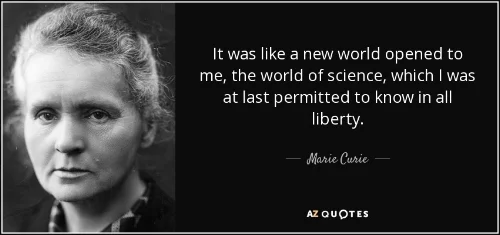Whether you're familiar with her as Marie Curie or as Madame Curie, hers is a fairly familiar name. Marie Curie is one of the few female scientists that many of us learned about in school. She does have name recognition, yes, but that's not why we're featuring her in October. No, we're celebrating the life and work of Marie Curie because as a woman who loved learning so much and as one dedicated to her calling as Marie was deserves to be celebrated.
Imagine growing up in a home with teachers for parents. You're encouraged in your studies and yet, you also just really, really love to learn. You're especially interested in math and science. Your father, in particular, encourages you in your learning. You study hard, do really well in school, and just when it's time to go to university you find...wait...nope, sorry. You can't attend. You're a woman. And as a woman, you're not allowed to attend university. You know that your sex doesn't determine your educational capabilities, so you press on and go so far as to take secret "underground" university classes, but those only take you so far. So, you decide to work out a deal with your sister. Knowing you both can succeed in university if given the chance, you decide to work hard for 5 years to send her to school in Paris and then when she's done with her courses, she would also work hard to send you to school in Paris. Deal struck, that's what you do. You work as a governess and a tutor for five years. Until finally, you move to Paris and attend classes. Money is still tight and sometimes all you can afford for food is bread, butter, and tea, but you don't care because you're doing what you love--studying science.
This, friends, is one of the reasons we're celebrating Marie Curie. That grit, that determination, that confidence that she had even when the social structure around her in Poland told her she couldn't because she was a woman kept her moving forward. She took all of that and turned it upside down and the world hasn't been the same since. Here are just a couple of examples of how:
Via azquotes.com
Not only did she earn two master's degrees, Marie also became the first woman in France to earn a PhD.
She discovered two new elements: radium and polonium.
From radium, Marie coined the term 'radioactivity.'
She was the first female Nobel laureate. She was awarded the Nobel Prize for Physics in 1903.
In 1911, she became the only person to ever receive two Nobel Prizes in two different scientific categories, this time for chemistry. At that time, in that age, or heck, even now, that's remarkable. You have to applaud that.
She saved millions of lives during World War I by creating “Little Curies,” which were trucks outfitted with X-ray machines that could be used in the field to find shrapnel and give soldiers a better chance at survival.
When the French government took too long to fund her “Little Curies,” Marie raised the needed funds by way of rich French women and then mobilized those same women to work the trucks on the battlefields.
There's so much more to learn about Marie Curie! She was an extraordinary human being with an incredible mind. Her confidence in herself and what she wanted to do propelled her forward with each new step. She was an incredible scientist whose work has changed the course of human history. The confidence that she had in herself compelled her to find a way to further her education, which led to some of the greatest scientific discoveries the world has ever known. Marie Curie knew there was more to be discovered, more to learn about, and that she could be the one to do it.
The Confident Chemist crate is available now through October 15! Don't miss out on this opportunity to introduce your future world changer to this incredible scientist while they explore the science of X-rays, make a fun glow in the dark project, and more! Subscribe today before they're gone at girlscancrate.com!


